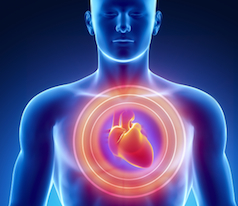
LONDON — Depressed patients tend to have more frequent chest pain, even in the absence of coronary artery disease, Emory cardiologists reported at the European Society of Cardiology Congress.
The findings suggest that pain and depression may share a common neurochemical pathway, says Salim Hayek, MD, a cardiology research fellow with Emory Clinical Cardiovascular Research Institute.
Hayek was scheduled to present the results at a press conference in London Monday, and also in a poster session Monday afternoon. The data comes from an investigation performed in collaboration with ECCRI co-director Arshed Quyyumi, MD and cardiovascular disease epidemiologist Viola Vaccarino, MD, PhD.
"Depression is a common and well-recognized risk factor for the development of heart disease," Hayek says. "Patients with known heart disease and depression tend to experience chest pain more frequently. However until now, it was not known whether that association was dependent on underlying coronary artery disease. Although our findings do not establish causality, they do suggest that depression is an important confounder of the relationship between chest pain and heart disease."
The study included 5825 adults enrolled in the Emory Cardiovascular Biobank between 2004 and 2013. The biobank is a prospective registry of patients undergoing cardiac catheterization at three Emory Healthcare sites in Atlanta. Biobank patients had an average age of 63 years, with 65 percent male and 22 percent African American.
Prior to cardiac catheterization, patients completed the Patient Health Questionnaire-9 (PHQ-9) to assess depressive symptoms and the Seattle Angina Questionnaire to assess chest pain frequency in the past month. The presence and severity of coronary artery disease was determined by angiogram. Patients completed the same questionnaires at one and five years post-procedure.
The researchers found that depression severity as measured by the PHQ-9 was independently associated with the frequency of chest pain, indicating that patients with more severe depression had more frequent chest pain. Even patients with mild depression had more frequent chest pain than patients with no depressive symptoms. The findings remained after adjusting for coronary artery disease severity, age, gender, race and traditional cardiovascular risk factors including smoking status, body mass index, blood pressure and blood lipid levels.
Patients with depression, whether women or men, were three times more likely to experience more frequent chest pain than those without depression. This was found to be true in patients with and without obstructive coronary artery disease.
A reduction in the severity of depression symptoms was associated with a decrease in the frequency of chest pain at follow-up. Notably, patients with depression who underwent revascularization did not have an improvement in chest pain frequency at one year follow-up.
"We found that depression is strongly associated with the frequency of chest pain in adults, with and without underlying coronary artery disease, and that patients with depression and heart disease did not have an improvement in their chest pain frequency even after coronary intervention," Hayek says. "One possible explanation for our findings is that pain and depression share a common neurochemical pathway."
Hayek adds: "Although depression is established as a risk factor for heart disease, there are no clear recommendations in the US for depression screening in patients with cardiovascular disease. ESC prevention guidelines recommend assessing patients for depression to prevent cardiovascular disease. Screening for depression in patients presenting with chest pain should be considered, and studies examining the effect of appropriate anti-depressive therapy on chest pain are needed."
"The fact that chest pain frequency at follow-up was decreased in patients whose depressive symptoms improved indicates that treating depression may help alleviate chest pain, after obstructive coronary artery disease as a cause of chest pain has been ruled out. This needs to be confirmed in randomised controlled trials."
Hayek is supported by the Katz Family Foundation Preventive Cardiology Grant.
